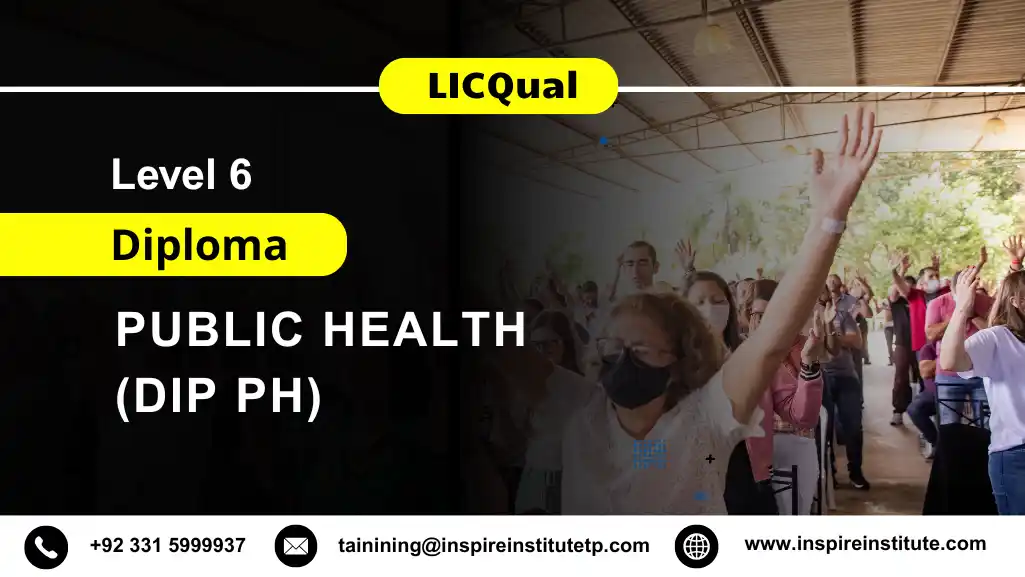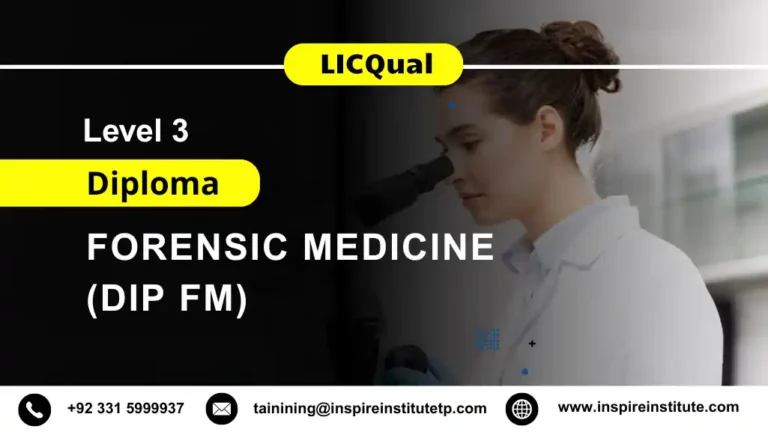LICQual Level 6 Diploma in Public Health (Dip PH)
The LICQual Level 6 Diploma in Public Health (Dip PH) is a UK-accredited qualification designed to equip healthcare professionals, policy makers, and public health practitioners with advanced knowledge and skills essential for improving community health outcomes. In an era of global health challenges, including pandemics, lifestyle-related diseases, and health inequities, this comprehensive diploma provides learners with the expertise to design, implement, and evaluate effective public health strategies. The program Diploma in Public Health integrates evidence-based learning with practical applications, preparing professionals to make a tangible impact on population health.
This diploma aims to develop a deep understanding of public health principles, epidemiology, health promotion, disease prevention, and policy formulation. Learners explore topics such as infectious and non-communicable diseases, health systems management, environmental health, and social determinants of health. The course emphasizes both theoretical frameworks and practical approaches, ensuring that graduates can apply knowledge effectively in real-world public health settings.
The LICQual Level 6 Diploma in Public Health (Dip PH) also focuses on leadership and management skills necessary for guiding public health teams and influencing policy decisions. Participants develop competencies in communication, stakeholder engagement, advocacy, and ethical decision-making, which are critical for effective public health practice.
Why Choose this Qualification
The LICQual Level 6 Diploma in Public Health (Dip PH) is a prestigious UK-accredited qualification designed to advance the careers of healthcare professionals, policy makers, and public health practitioners. This diploma Diploma in Public Health equips learners with advanced knowledge, practical skills, and strategic insights necessary to design, implement, and evaluate effective public health interventions. By completing this Diploma in Public Health learners enhance their professional credibility while contributing meaningfully to the improvement of population health and healthcare systems globally.
Key Reasons to Choose this Qualification
Comprehensive Public Health Knowledge
- Gain in-depth understanding of epidemiology, disease prevention, and health promotion strategies.
- Explore social determinants of health and their impact on community well-being.
- Study environmental health, global health challenges, and policy frameworks.
- Develop the ability to critically analyze public health research and data.
- Understand strategies for controlling infectious and non-communicable diseases.
Practical Application Skills
- Acquire competencies in public health program design, monitoring, and evaluation.
- Learn to conduct health needs assessments and community health surveys.
- Apply evidence-based approaches to improve health outcomes.
- Develop practical skills in project management and implementation of interventions.
- Engage in real-world case studies to enhance decision-making capabilities.
Recognised UK-Accredited Qualification
- Obtain a globally recognised diploma that validates professional competence.
- Enhance employability and credibility within national and international health sectors.
- Demonstrate adherence to UK and global public health standards.
- Open doors to leadership, research, and policy-making roles.
- Strengthen your profile for postgraduate study opportunities.
Leadership and Management Development
- Build strategic leadership skills for guiding public health teams.
- Develop competencies in communication, advocacy, and stakeholder engagement.
- Learn ethical decision-making in complex public health scenarios.
- Acquire skills in managing multidisciplinary teams effectively.
- Enhance your ability to influence policy and drive health initiatives.
Evidence-Based Training
- Engage with the latest research, guidelines, and best practices in public health.
- Learn to critically evaluate scientific literature for informed decision-making.
- Integrate research evidence into practical health interventions.
- Stay updated with global trends and emerging threats.
- Promote continuous improvement in healthcare delivery.
Flexible Learning Pathway
- Study at your own pace without disrupting professional commitments.
- Access structured modules, digital resources, and guided assignments.
- Benefit from personalized academic support and mentorship.
- Combine professional growth with practical learning seamlessly.
- Achieve the diploma while maintaining work-life balance.
Career Advancement Opportunities
- Pursue leadership positions in public health agencies, NGOs, or research institutions.
- Enhance opportunities for roles in health policy, epidemiology, and community health.
- Prepare for international career prospects in public health management.
- Establish yourself as a competent and skilled public health professional.
- Serve as a foundation for higher-level postgraduate qualifications.
Enhanced Impact on Population Health
- Implement interventions that address health inequalities and community needs.
- Improve patient and community outcomes through evidence-based strategies.
- Develop skills for sustainable public health planning and implementation.
- Promote preventive healthcare awareness.
- Contribute to improving healthcare systems and population well-being globally.
This LICQual Level 6 Diploma in Public Health (Dip PH) provides learners with the knowledge, skills, and professional recognition necessary to excel in public health leadership, practice, and research. By completing this Diploma in Public Health learners are empowered to make measurable improvements in health outcomes and advance their careers in the dynamic field of Diploma in Public Health serves as a valuable pathway toward achieving professional recognition and advancing psychiatric practice worldwide.
Course Overview
LICQual UK Awarding Body
Average Completion Time:
6-24 Months
Study Units: 6 Units
Evidence & Assignment Based
Mandatory Units
Who Should Take This Course
The LICQual Level 6 Diploma in Public Health (Dip PH) is designed for professionals who aim to make a meaningful impact in the health sector by acquiring advanced knowledge, practical skills, and leadership capabilities in public health. This course is suitable for individuals who seek to enhance their understanding of population health, disease prevention, health promotion, and healthcare management. By completing this Diploma in Public Health learners gain the expertise to design, implement, and evaluate effective public health strategies while meeting international standards of practice.
This course is suitable for
Healthcare Professionals
- Enhance your understanding of epidemiology, disease prevention, and health promotion.
- Develop skills to implement evidence-based public health programs in clinical settings.
- Learn to evaluate healthcare outcomes and improve community health interventions.
- Gain leadership competencies to manage public health initiatives effectively.
- Apply knowledge to address health inequalities in diverse populations.
Public Health Practitioners
- Strengthen expertise in population health assessment and planning.
- Acquire practical skills in monitoring and evaluating public health programs.
- Learn to apply policies that reduce risk factors for chronic and infectious diseases.
- Develop competencies in community engagement and health advocacy.
- Build the ability to respond to emerging public health challenges.
Policy Makers and Administrators
- Understand public health policy design and implementation at local and national levels.
- Develop skills to analyse health data and inform evidence-based decision-making.
- Learn to lead multidisciplinary teams in health programs and interventions.
- Enhance your ability to draft regulations that improve public health outcomes.
- Gain strategic knowledge to influence health policy and legislation.
Researchers and Academics
- Acquire skills in public health research methodology and statistical analysis.
- Conduct health needs assessments and evaluate population health trends.
- Learn to publish evidence-based findings in academic journals.
- Contribute to global public health knowledge through applied research.
- Mentor and train future public health professionals effectively.
NGO and Community Health Workers
- Learn to design and implement community-based health programs.
- Strengthen capabilities in disease prevention, health promotion, and awareness campaigns.
- Monitor and evaluate intervention outcomes to ensure measurable impact.
- Enhance communication and advocacy skills for community engagement.
- Build capacity to collaborate with governmental and international health agencies.
Clinical and Hospital Administrators
- Apply public health principles to improve hospital and healthcare system management.
- Develop strategies to reduce infection risks and promote patient safety.
- Implement quality improvement initiatives within clinical settings.
- Train staff on health promotion, disease prevention, and emergency response.
- Enhance operational efficiency using evidence-based health strategies.
International Health Professionals
- Prepare to work in global health programs and humanitarian projects.
- Gain skills to respond to infectious disease outbreaks and public health emergencies.
- Learn to implement culturally sensitive health interventions across diverse populations.
- Strengthen cross-border collaboration and knowledge-sharing in health initiatives.
- Meet international standards for professional practice in public health.
Students and Graduates in Health Sciences
- Gain a strong foundation in public health principles and practices.
- Build practical skills in research, data analysis, and program evaluation.
- Develop leadership and strategic planning capabilities.
- Enhance employability in hospitals, NGOs, governmental agencies, and research institutions.
- Prepare for advanced postgraduate studies in public health and related disciplines.
The LICQual Level 6 Diploma in Public Health (Dip PH) is ideal for professionals, academics, and aspiring leaders in the health sector. This Diploma in Public Health equips learners with measurable knowledge, practical skills, and strategic competencies to excel in management, policy, and research, ensuring a lasting impact on population health worldwide.mpassionate, evidence-based care and to contribute meaningfully to the advancement of mental health on both national and global levels.
Course Benefits
The LICQual Level 6 Diploma in Public Health (Dip PH) is a UK-accredited qualification designed for healthcare professionals, public health practitioners, and aspiring health leaders who aim to advance their expertise in population health, disease prevention, and health promotion. This comprehensive, assignment-based Diploma in Public Health integrates theoretical knowledge with practical applications, enabling learners to develop, implement, and evaluate effective public health strategies. Through evidence-based learning and flexible study pathways, this qualification prepares professionals to address global health challenges and improve community well-being with confidence and competence.
Key Benefits of the Course
- Specialist Knowledge:
Gain a deep understanding of public health principles, epidemiology, biostatistics, environmental health, and health policy. Learners explore critical topics such as infectious and non-communicable diseases, health promotion strategies, and global health initiatives. The course also covers health systems management, risk assessment, and preventive interventions, equipping learners to deliver impactful population health programs. - Practical Application:
Develop hands-on skills in designing, implementing, and evaluating programs. Through case studies, research projects, and field-based simulations, learners enhance their ability to analyse health data, monitor community health outcomes, and implement evidence-based interventions. The program Diploma in Public Health trains professionals to respond effectively to public health emergencies and collaborate with multidisciplinary teams for optimal impact. - Recognised Qualification:
Earn a prestigious UK-accredited diploma that validates your expertise practice and management. The LICQual Level 6 Diploma in Public Health (Dip PH) is recognised internationally, ensuring learners meet global health standards. This Diploma in Public Health enhances professional credibility and opens opportunities in policy-making, healthcare administration, research, and international health organizations. - Flexible Learning Pathway:
Designed for working professionals, the assignment-based structure allows learners to study without disrupting their careers. Learners can progress at their own pace with access to structured guidance, digital resources, and personalized mentorship, creating a seamless balance between education and professional responsibilities. - Evidence-Based Training:
Explore the latest research, public health models, and guidelines that inform modern health practice. The course emphasizes the application of evidence-based strategies in health assessment, disease prevention, and health promotion. Learners gain the skills to critically evaluate scientific literature and implement validated interventions that improve population health outcomes. - Career Development:
This qualification expands career prospects across hospitals, community health organizations, governmental agencies, NGOs, and academic institutions. Graduates may pursue roles such as Public Health Specialist, Epidemiologist, Health Policy Analyst, or Research Coordinator. It also serves as a foundation for advanced postgraduate studies or specialization in public health and allied disciplines. - Enhanced Community Impact:
Learn to implement ethical, culturally sensitive, and sustainable public health interventions. The Diploma in Public Health builds competence in addressing health disparities, promoting healthy behaviours, and improving overall community well-being. Learners are equipped to develop policies and programs that positively impact diverse populations globally. - Professional Growth:
Strengthen critical thinking, data analysis, leadership, and communication skills essential for public health practice. The Diploma in Public Health encourages reflective learning, interdisciplinary collaboration, and strategic decision-making. Graduates emerge as competent, confident professionals capable of advancing global standards.
The LICQual Level 6 Diploma in Public Health (Dip PH) empowers professionals to become leaders in population health management through advanced knowledge, practical expertise, and globally recognised credentials. It enhances career prospects while contributing significantly to the improvement of health outcomes and public well-being worldwide.ntal health services and patient outcomes worldwide.
Eligibility Criteria
The LICQual Level 6 Diploma in Public Health (Dip PH) is a UK-accredited qualification designed for healthcare professionals, public health practitioners, and aspiring health leaders who aim to advance their knowledge and practical expertise in public health. This assignment-based diploma integrates theoretical foundations with real-world applications, preparing learners to assess, plan, implement, and evaluate public health programs effectively.
Educational Background:
Applicants should hold a recognised qualification in medicine, nursing, healthcare, epidemiology, or a related public health field. A Level 5 diploma or equivalent qualification in public health, healthcare management, or health sciences may also be accepted. Candidates with international degrees in public health or allied disciplines will be evaluated individually to determine eligibility and equivalence to UK standards.
Professional Experience:
A minimum of one year of experience in healthcare, community health, public health practice, or a related field is recommended. Previous exposure to health program implementation, health promotion, or community health assessment provides an advantage. Motivated applicants with a strong interest in public health, policy development, or population health management, even without direct professional experience, are encouraged to apply.
Age Requirement:
Applicants must be at least 18 years old at the time of enrolment. This ensures that learners possess the maturity, ethical understanding, and professional responsibility required for advanced study and practical application in public health.
Language Proficiency:
As the programme is delivered entirely in English, learners must demonstrate proficiency in reading, writing, and communication. A minimum IELTS score of 6.0 or an equivalent qualification is recommended for non-native English speakers to ensure effective participation in assignments, discussions, and assessments.
Technical Requirements:
Learners should have access to a computer or laptop with a reliable internet connection to participate in online learning, access study materials, and submit assignments. Basic computer literacy, including proficiency in research, data analysis, document preparation, and communication tools, is essential for academic success in this programme.
Required Documents:
Applicants are required to submit the following documents during registration:
A valid ID card or passport for identity verification.
Academic transcripts or certificates of previous qualifications.
Proof of professional experience in healthcare, or community health (if applicable).
The Qualification Process
LICQual Level 6 Diploma in Public Health (Dip PH) follows a structured pathway to ensure learners gain comprehensive knowledge, practical skills, and professional competence in community oral healthcare.
Step 1: Self-Assessment
Learners review the entry requirements to confirm eligibility. Candidates with a background in dentistry, oral health, or public health are encouraged to apply.
Step 2: Registration
Complete the registration process by submitting required documents such as proof of qualifications, a valid ID, and payment of enrollment fees.
Step 3: Induction
An induction session is conducted to:
- Verify learner eligibility and documentation.
- Introduce study materials, learning outcomes, and assessment procedures.
Step 4: Learning and Evidence Submission
Learners complete assignments, case studies, and practical exercises demonstrating competence in public health dentistry, community oral health assessment, preventive strategies, and program planning.
Step 5: Feedback and Revision
Assessors review submitted evidence and provide constructive feedback. Learners can revise and resubmit work to meet all required standards.
Step 6: Competence Validation
Final submissions are evaluated to confirm that learners have met all theoretical and practical learning outcomes.
Step 7: Internal Quality Assurance (IQA)
The IQA team reviews the assessment process to ensure accuracy, fairness, and compliance with international standards.
Step 8: External Verification (EQA)
External verifiers validate the authenticity and quality of learner achievements.
Step 9: Certification
Upon successful verification, learners are awarded LICQual Level 6 Diploma in Public Health (Dip PH), demonstrating advanced proficiency in community oral healthcare and preparing them for professional growth in dental public health, preventive dentistry, and healthcare policy.






